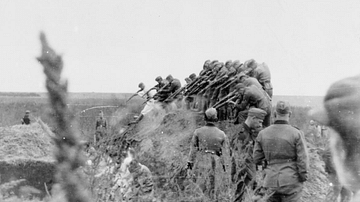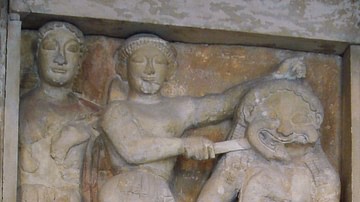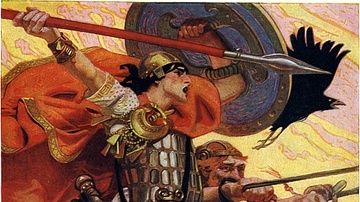Search
Search Results

Definition
Tantalus - The Man Who Could Never Quench His Thirst
Tantalus is a figure from Greek mythology who was the rich but wicked king of Sipylus. For attempting to serve his own son at a feast with the gods, he was punished by Zeus to forever go thirsty and hungry in Hades despite being stood in...

Definition
Gunpowder Plot - Guy Fawkes & the Plan to Blow up Parliament
The 1605 Gunpowder Plot was a failed attempt by pro-Catholic conspirators to blow up the English Parliament on 5 November and kill King James I of England (r. 1603-1625) and the entire nobility along with him. The plot was discovered when...

Definition
Theseus
Theseus is a legendary hero from Greek mythology who was considered an early king of Athens. Famously killing villains, Amazons, and centaurs, Theseus' most celebrated adventure was his slaying of the fearsome Minotaur in the labyrinth of...

Definition
Einsatzgruppen - The Nazi Killing Squads of WWII
Einsatzgruppen ('deployment groups') were secret Nazi killing units, who systematically sought out and murdered civilians identified as enemies of the Third Reich. Operating without any legal restrictions in territories newly conquered by...

Definition
Perseus
Perseus is one of the greatest and oldest pan-Hellenic heroes of Greek mythology. Perseus famously killed the dreaded Medusa, a Gorgon with snakes as hair and whose stare turned men to stone. Perseus also carried out the daring rescue of...

Definition
Ravana
Ravana is the mythical multi-headed demon-king of Lanka in Hindu mythology. With ten heads and twenty arms, Ravana could change into any form he wished. Representing the very essence of evil, he famously fought and ultimately lost a series...

Definition
Captain Kidd
Captain William Kidd (c. 1645-1701) was a Scottish privateer turned pirate who, despite only ever capturing one significant prize ship, has become legendary thanks to the persistent rumour he buried a fantastic treasure that nobody has yet...

Definition
Typhon
Typhon (also Typheus) is the largest and most dreadful monster in Greek mythology. He was tall, with a brutish face, and had wings, countless snakeheads in place of hands, and a lower body made up of coiled serpents. His eyes flashed fire...

Definition
Cú Chulainn
Cú Chulainn (pron. Koo-kul-in), also Cúchulainn, is one of the greatest heroes of Irish-Celtic mythology, particularly the Ulster Cycle. The son of another cultural hero-figure, Lugh, Cú Chulainn is a mighty warrior whose weapon is Gáe Bolga...

Definition
Ghosts in the Ancient World
A belief in an afterlife was central to every major civilization of the ancient world and this encouraged the recognition of the reality of ghosts as the spirits of the departed who, for one reason or another, either returned from the realm...